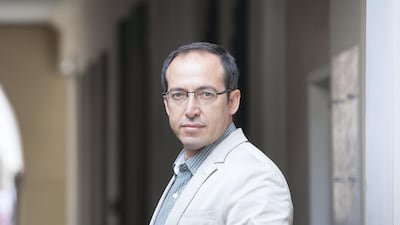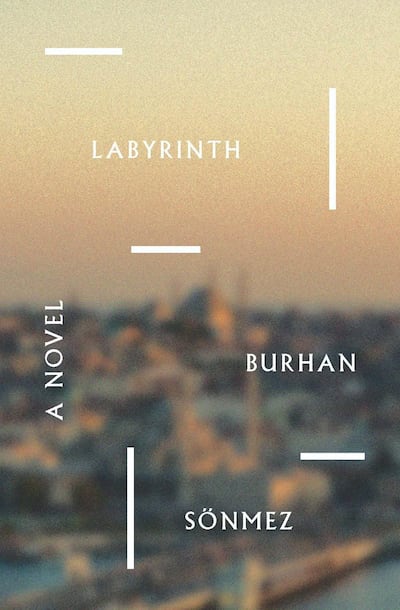Burhan Sonmez's novels revolve around dislocated or dispossessed individuals who have been dragged out of their comfort zones and are anxious to restore their balance and reclaim their identities.
In his 2009 debut North, a man's quest into unfamiliar territory to learn more about the father he never knew, turns into a journey of self-discovery. Sins and Innocents (2011) centres on a male Kurdish refugee and an Iranian woman who cross paths in Cambridge and tell tales about the homelands they left behind. Shared storytelling as a means of solace and solidarity is employed to greater effect in Sonmez's third novel, Istanbul Istanbul (2015). Four prisoners in underground cells attempt to cancel out the monotony of incarceration and the horror of their next torture session by swapping tales about the city above them.
The sense of displacement that runs through Sonmez's fiction is most keenly felt in his latest novel Labyrinth, a bold and entrancing work. It follows a blues singer called Boratin who, after failing to kill himself by jumping off the Bosphorus Bridge, grapples with memory loss. "I am back at zero," he says. "No matter where I step, I feel as though I am about to tumble into a void." Nonetheless, he wanders the streets of Istanbul trying to regain his bearings and his history.
"With this book I wanted to understand a few things: the connection or clash between individual memory and social memory, between body and conscience, and between history that is dead and past that is alive," Sonmez explains. "I wanted to tackle these with the spirit of Camus and the language of Borges."
Labyrinth is Sonmez's fourth novel. We are lucky to have it, for it was only after considerable upheaval in his life that he turned to writing. Born in Turkey, Sonmez worked as a human rights lawyer in Istanbul and was a founder of the social-activist culture organisation Taksav. In 1996 his participation in a demonstration led to him being savagely beaten and left for dead by Turkish security forces. He moved to Britain, where he received medical treatment with the support of the charity Freedom from Torture in London. Confined to bed for months, he read and read – and started to write.
“That was the turning point in my life,” he says. “I realised then that I had an appetite for novel-writing.”
Poetry, he says, was his first love. "I was born with poetry. Though I turned my hand to fiction, I still feel that my soul is fed with poetry. The energy of my novels comes from poems that I have not written." But an interest in stories, and possibly an aptitude for telling them, was instilled at an early age. "Growing up in a small village in rural Anatolia gave me the treasure of oral literature," he says. "Because my mother tongue, Kurdish, was an officially proscribed language, we had to save it in our minds. My mother was a mesmerising storyteller of Kurdish tales."
Two settings stand out in Sonmez's work. The first is Cambridge in Sins and Innocents. It turns out it was no arbitrarily chosen backdrop. "Cambridge was exile for me," Sonmez reveals. "But after a certain time you need to turn your place of exile into your home, otherwise exile will kill you. I made Cambridge home and later returned to my other home, Istanbul. I now live in both cities."
That second setting, Istanbul, looms large in Sonmez's two most recent books. In each case he resisted the usual depiction of the city as a meeting point between East and West, Asia and Europe. "We need to see other meetings," he says, "like a meeting of languages, a meeting and division of social classes. Istanbul is a city of treasure and poverty. The darkness of underground intertwines with the brightness of aboveground, often in the same street. It is young and ancient. The fusion of all these different currents can be felt, alongside their clashes with each other.
"When I wrote Istanbul Istanbul, I wanted to contrast the beauty of the city with the stories of people who were in pain. The combination of beauty and pain is essential in Istanbul. With Labyrinth, I wanted to see the city from another angle, namely the meaning of memory and existence."
In Labyrinth, Boratin's friend Hayala declares that "Istanbul holds no promise of anything to anyone any more. This city has suffocated under the dark cover of its old charm." Has Sonmez channelled his own personal view through one of his characters?
"It is the view of my generation," he replies. "People feel sad about the disappearing soul of the city. They feel abandoned, whereas in fact they abandoned the city by not defending it enough against greedy destruction and a selfish construction mentality. The problem is that Istanbul has been changing too fast. The population has tripled in 50 years and that is not easy to adapt to. I partly share the view of my generation that the city is being suffocated, but still keeps its beauty."
Sonmez may be concerned about the soul of the city, but he is alarmed by the state of the nation. Turkey's current political climate is "awful", he adds. There is, he says, "no rule of law". "Poverty is widespread and the rich are getting richer. People have lost hope for the future and populist politicians play with that."
Sonmez continues to stand up and speak out. He is active in daily politics and contributes to the independent left-wing newspaper BirGun. Does he live without fear of persecution? "There is no state of 'without fear' in my country," he answers. "We can do everything with fear. The point is how to do it despite fear. That is the only way to fight darkness." He pauses. "But I am an incurable optimist. We will stop darkness and heal our wounds. I have hope."


